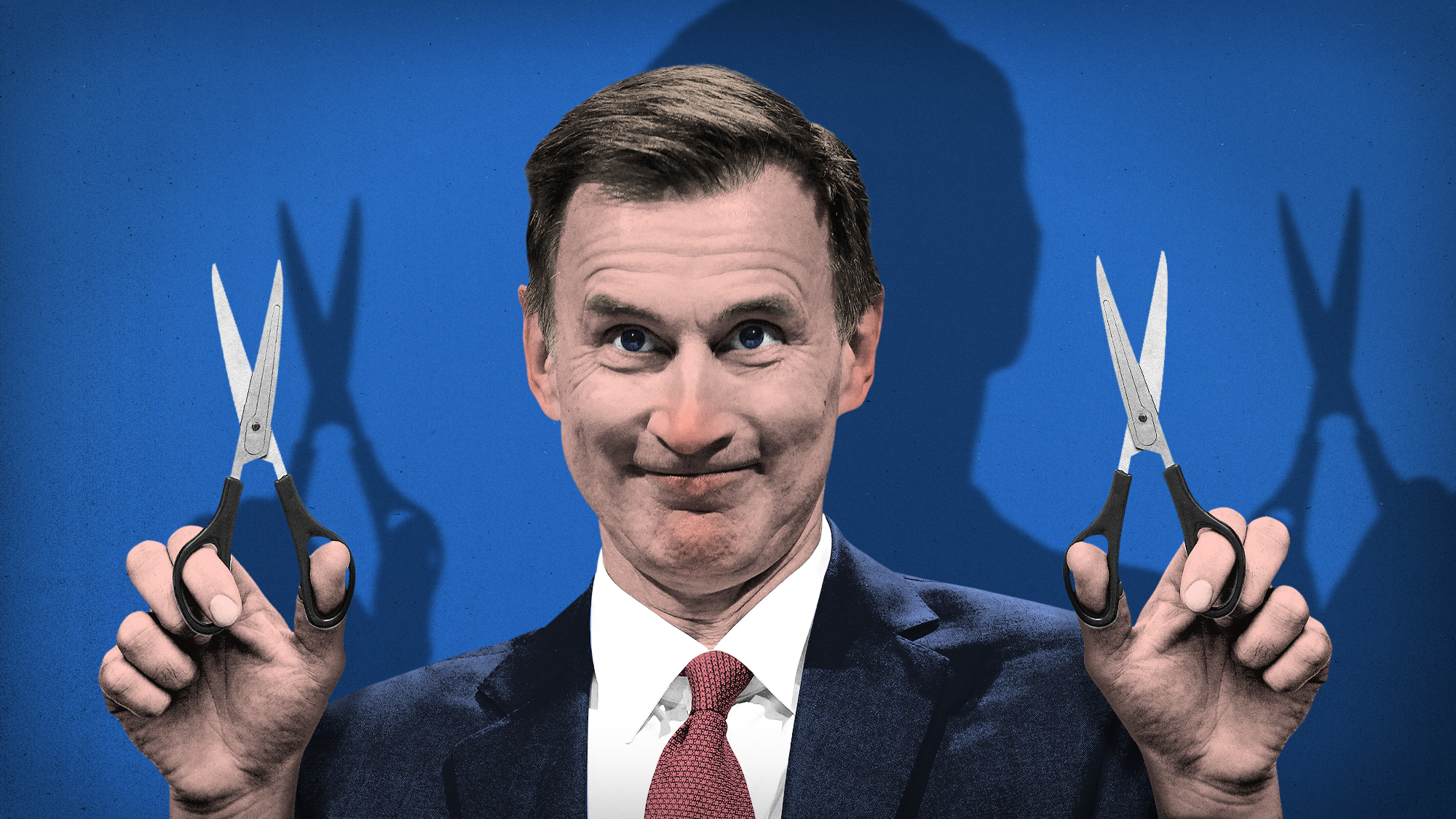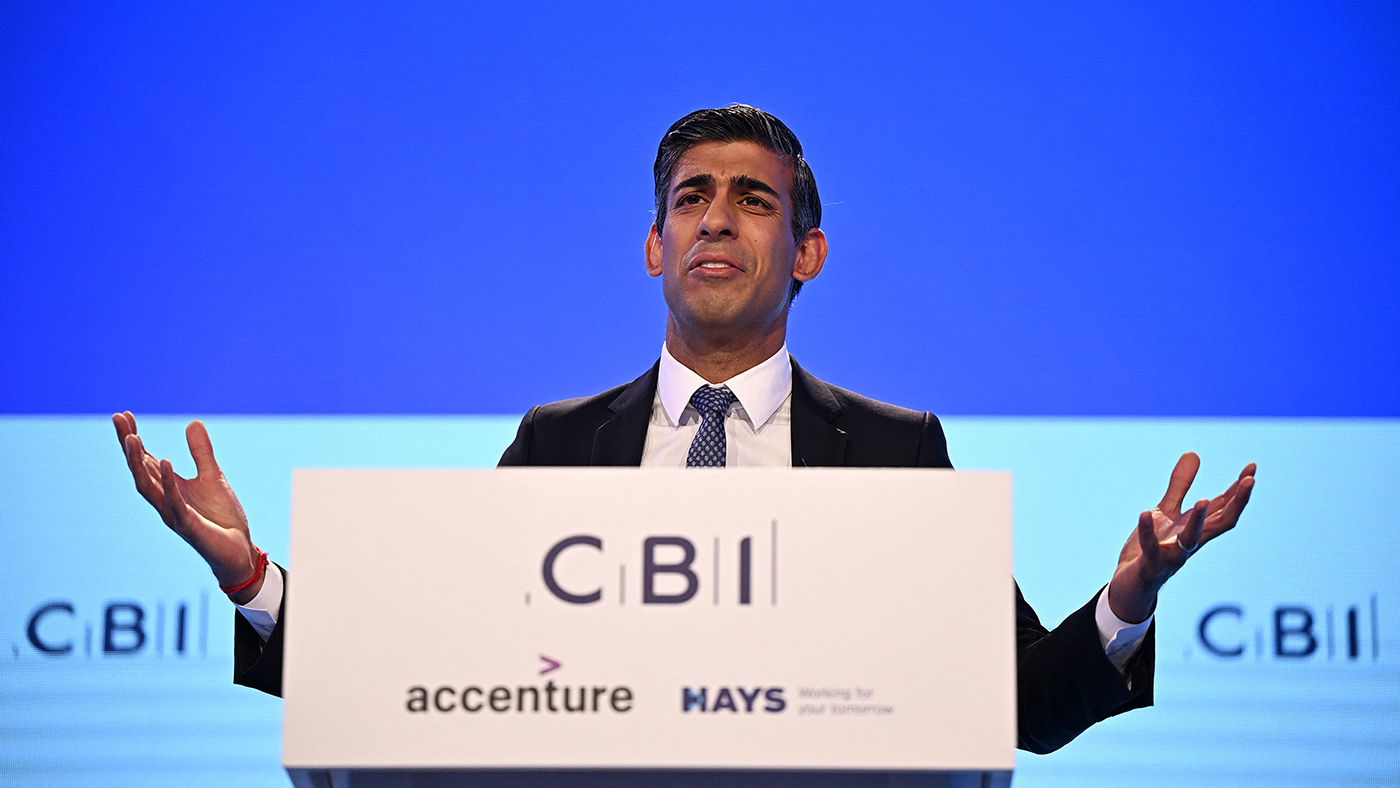Autumn Statement 2016: Real wages will not grow for a decade, says IFS
Think-tank warns of 'dreadful' times ahead, as Resolution Foundation say lower-income families will lose most
A free daily email with the biggest news stories of the day – and the best features from TheWeek.com
You are now subscribed
Your newsletter sign-up was successful
"One cannot stress enough how dreadful that is - more than a decade without real earnings growth. We have certainly not seen a period remotely like it in the last 70 years."
These were the stark comments of Paul Johnson, the director of the Institute of Fiscal Studies (IFS), as he delivered his think-tank's annual analysis of the Autumn Statement yesterday.
His gloomy outlook continued: "Half of the wage growth projected for the next five years… is not now projected to happen," he said, adding that real wages, which take account of inflation, will be lower in 2021 than in 2008, says the Financial Times.
The Week
Escape your echo chamber. Get the facts behind the news, plus analysis from multiple perspectives.

Sign up for The Week's Free Newsletters
From our morning news briefing to a weekly Good News Newsletter, get the best of The Week delivered directly to your inbox.
From our morning news briefing to a weekly Good News Newsletter, get the best of The Week delivered directly to your inbox.
Analysis from fellow think-tank Resolution Foundation shows the "biggest losers between now and 2020 will be lower income families", says the BBC.
Specifically, while cuts to universal credit were modified, the bulk of the government's savings will go ahead. Coupled with a freeze in working-age benefits while inflation is expected to rise, this will hit the poorest third of households, Resolution Foundation warns.
This stands in contrast to the period immediately after the financial crisis, when top earners saw their living standards squeezed the most.
In addition, IFS said older households will continue to fare better than younger families as the government maintains its commitment to above-inflation increases to the state pension.
A free daily email with the biggest news stories of the day – and the best features from TheWeek.com
Very low-income working households will, however, see their incomes rise faster as a result of the ongoing rises in the national living wage.
The Spectator questions the think-tanks' analysis, arguing that real wages fell fastest in the three years after the crisis and will continue to grow by around five per cent over the coming five years.
It also says the reports fail to take account of tax changes - increases to the tax-free personal allowance - that have "allowed people to keep more of the income they have earned".
The magazine adds: "A graph of real disposable income – that is what people have to left to spend after tax, adjusted for inflation – would show a different story."
Autumn Statement 2016: 'Losses outweigh gains for Jams'
24 November
Chancellor Philip Hammond announced a series of measures designed to help "just about managing" families - "Jams" - in his Autumn Statement yesterday. However, according to The Guardian, these households will still find themselves struggling as the losses he confirmed are yet to come will "outweigh the gains".
One of the headline concessions was a moderation of cuts to universal credit, the benefit being rolled out to replace six others, including working tax credits. Calls for the cuts to be reversed altogether, including from Resolution Foundation think-tank, were dismissed, however.
As a result, the employment allowance - the amount of benefit taken away for each pound earned above the earnings threshold - will fall from 65p to 63p, at a cost to the Treasury of £700m a year.
The Daily Telegraph reports that from next year, the employment allowance will drop from "£222 per month for a couple with children and £263 for a single parent to £192", saving the government £3bn a year.
Separate changes will limit child working tax credits and the payment relating to children under universal credit to only the first two children for new claimants.
Shadow chancellor John McDonnell said: "It will be too little, too late for those working families who have had to bear the brunt of six wasted years of failed Tory economic policies."
There was also no reversal of the cuts to the employment and support allowance paid to people with a registered disability who are unemployed but able to work. This is to fall by £30 a week to £73 next year, putting it in line with jobseekers' allowance.
In addition, the government did not budge on a new benefits cap, which came into force earlier this month and cuts the maximum a non-working household can claim from £26,000 to £20,000 a year.
Hammond confirmed there are, at least, to be no new welfare savings in this parliament, while additional support was provided through a freeze to fuel duty and a ban on estate agent letting fees.
He also announced he is going ahead with plans to increase the tax-free allowance on earnings to £12,500 in the next four years, starting at £11,500 next April, when the national living wage will also rise to £7.50 per hour.
There were tax changes that will hurt low and middle earners, though. In particular, the Chancellor increased the insurance premium tax from ten to 12 per cent, raising the cost of most insurance policies.
Perhaps most notable for low earners were updated forecasts from the Office for Budget Responsibility, which The Times says now show sluggish wages being overtaken by inflation in the second half of 2017.
This is all the result of Brexit and means real wages will turn negative again while unemployment is projected to start rising. That's the real sting in the tail for those already struggling to get by.
Autumn Statement 2016: Hammond invests £3.7bn in new housing
23 November
Chancellor Philip Hammond has used his first set-piece policy statement to increase borrowing to boost the economy in the face of the headwinds caused by this summer's vote for Brexit.
In an Autumn Statement that he said reflected "times have moved on", the Chancellor told the Commons the economy needed to be "match fit" for the challenges ahead and announced a £23bn Productivity Investment Fund to boost lacklustre output and a £2.3bn pot to to help free up land to provide an extra 100,000 affordable houses a year.
This money for the new housing is in addition to a £1.4bn fund for building homes in England, making a £3.7bn pot in total.
The schemes reflected his own preference for "high value" investments that produce short-term economic benefits, he said.
As expected, Hammond also announced spending on small-scale road and rail schemes in the north, the Midlands and elsewhere across the UK, as well as £1bn to help roll out super-fast broadband and 5G mobile connectivity.
He also paid tribute to his predecessor George Osborne's efforts to reduce the deficit and said he remained "firmly committed to returning the public finances to surplus as soon as practicable".
As a result, there was a revised set of austerity targets. New draft legislation to constrain spending will require the budget deficit to be no more than two per cent in this parliament and returned to surplus as soon as possible in the next.
In addition, all of the "efficiency" savings that were set out for government departments in 2015 for this parliament were confirmed "in full".
A package of measures to support hard-pressed "just about managing families" - or the "Jams" as they are being called - was also only made possible by a £7bn tax clampdown on big businesses, stopping them, for example, from avoiding taxes in years when they make big profits by using deferred losses from the past.
In addition middle-class salary perks are removed, with all salary sacrifice schemes abolished and subject to tax from next year, with the exceptions of those relating to pension savings, childcare and the promotion of cycling to work.
These measures will fund a range of giveaways to low and middle-earners, including reducing the rate at which universal credit is removed when a claimant returns to work, freezing fuel duty for the seventh year running, effectively cancelling a 2p tax rise and committing to the manifesto pledge to increase the tax-free income allowance to £12,500.
In addition, Hammond confirmed forecasts from the Office for Budget Responsibility showing economic growth falling by around a third to 1.4 per cent next year and by 2.4 per cent over the coming five years as a whole.
Updated analysis now sees the budget remaining in deficit by the end of this parliament, but the new fiscal rules still offer "headroom" to respond to a faster than expected slowdown in the economy.
Critically, there was no extra funding announced for social care, in spite of calls from across the political spectrum and a wave of questions from across the house for the Prime Minister in her own weekly grilling this afternoon.
Autumn Statement 2016: 'Jam' sweeteners and a debt surge
23 November
Chancellor Philip Hammond will announce his first set-piece policy package later today with an Autumn Statement featuring "giveaways and gloomy forecasts", The Guardian says.
Leaks from the Tory MP's speech so far have mainly focused on support for so-called "Jam" families – those low and middle-income households "just about managing" to make ends meet after core living expenses are deducted.
The Financial Times adds that more recent briefings suggest Hammond will "steal a Labour manifesto pledge" and ban the hefty fees letting agents charge renters for simple administration work.
These have soared to an average of £337 per tenancy and raise an additional £380m a year for agents, who typically also bill landlords at the same time, says The Times.
Other trailed measures include a freeze to fuel duty, cutting air passenger duty and further steps to increase the personal tax allowance in line with the Tories' manifesto commitment for it to reach £12,500 a year.
Hammond will also confirm a new rate for the national living wage from April. The expected £7.50 an hour is up from the current £7.20 but below the £7.60 that had been predicted.
Meanwhile, the rate at which universal credit is removed when claimants start work is to be cut from 65p to 63p for each pound earned. Reductions in the allowance below which earnings do not affect benefits will not change, however.
The Daily Telegraph reports that £1.4bn more will be made available to provide 40,000 extra affordable homes to buy or rent each year, in addition to a £4.3bn fund that already exists. In addition, there will also be measures to boost growth ahead of Brexit, including £1.3bn for road upgrades, £400m for super-fast broadband roll-out and £2bn in tax breaks for science and research.
But the statement will also confirm far lower growth forecasts and that government borrowing will be £100bn higher over the coming five years.
As such, giveaways are necessarily modest. The Guardian's Nils Pratley says there is little indication Hammond will find more money to support social care services, which have been ravaged by council budget cuts.
"The point of issuing edited highlights in advance is to try to maximise the applause so that the complaints are drowned out," he says. "Hammond is playing a grubby game."
-
 6 of the world’s most accessible destinations
6 of the world’s most accessible destinationsThe Week Recommends Experience all of Berlin, Singapore and Sydney
-
 How the FCC’s ‘equal time’ rule works
How the FCC’s ‘equal time’ rule worksIn the Spotlight The law is at the heart of the Colbert-CBS conflict
-
 What is the endgame in the DHS shutdown?
What is the endgame in the DHS shutdown?Today’s Big Question Democrats want to rein in ICE’s immigration crackdown
-
 Five key takeaways from Jeremy Hunt's Autumn Statement
Five key takeaways from Jeremy Hunt's Autumn StatementThe Explainer Benefits rise with higher inflation figure, pension triple lock maintained and National Insurance cut
-
 Would tax cuts benefit the UK economy?
Would tax cuts benefit the UK economy?Today's Big Question More money in people's pockets may help the Tories politically, but could harm efforts to keep inflation falling
-
 Why UK companies are facing a dystopian, zero-growth future
Why UK companies are facing a dystopian, zero-growth futurefeature In prioritising stability, the Treasury risks ‘stifling enterprise and entrepreneurship’
-
 Labour shortages: the ‘most urgent problem’ facing the UK economy right now
Labour shortages: the ‘most urgent problem’ facing the UK economy right nowSpeed Read Britain is currently in the grip of an ‘employment crisis’
-
 Will the energy war hurt Europe more than Russia?
Will the energy war hurt Europe more than Russia?Speed Read European Commission proposes a total ban on Russian oil
-
 Will Elon Musk manage to take over Twitter?
Will Elon Musk manage to take over Twitter?Speed Read The world’s richest man has launched a hostile takeover bid worth $43bn
-
 Shoppers urged not to buy into dodgy Black Friday deals
Shoppers urged not to buy into dodgy Black Friday dealsSpeed Read Consumer watchdog says better prices can be had on most of the so-called bargain offers
-
 Ryanair: readying for departure from London
Ryanair: readying for departure from LondonSpeed Read Plans to delist Ryanair from the London Stock Exchange could spell ‘another blow’ to the ‘dwindling’ London market